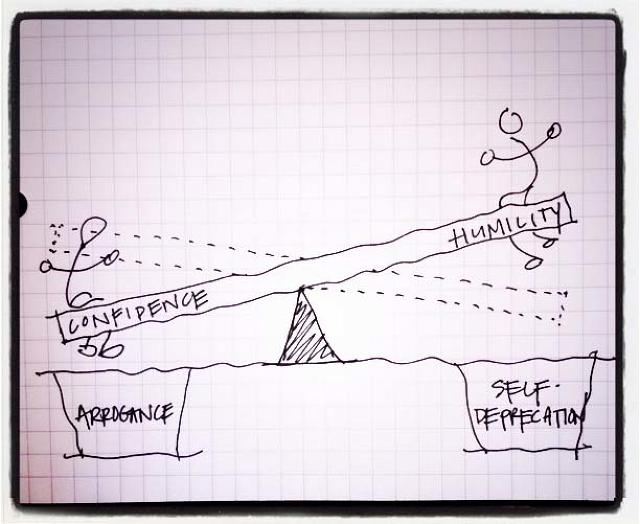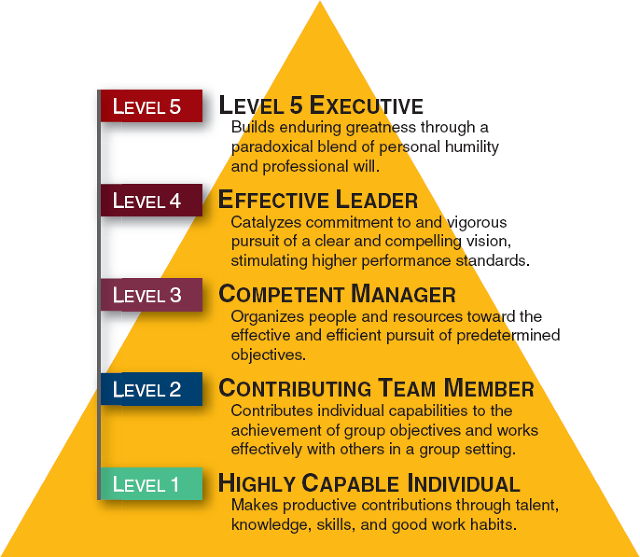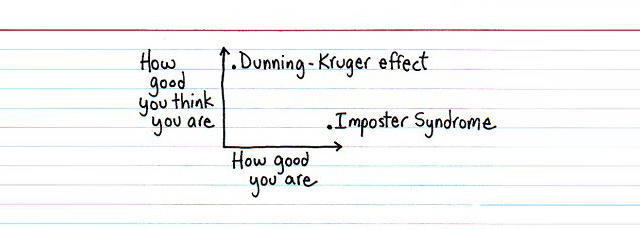
SUCCESSFUL LEADERS MANAGE TO BE CONFIDENT WITHOUT BEING ARROGANT. HERE'S HOW THEY BLEND IN HUMILITY TO MAKE ROOM FOR OTHERS' IDEAS.
Try to think back to a time when you felt incredibly confident.
You instinctively knew you could handle whatever came at you. You were on top of things, making all the right moves. You were in the zone.
It’s an amazing feeling, and one that we’d probably all like to have more often.
The book The Confidence Code gets right to the point of why this element is so crucial in our lives:
Scholars are coming to see (confidence) as an essential element of internal well-being and happiness, a necessity for a fulfilled life. Without it you can’t achieve flow, the almost euphoric state described by psychologist Mihaly Csikszentmihalyi as perfect concentration; the alignment of one’s skills with the task at hand.
We’re attracted to confidence—the true, deeply felt kind that inspires us to follow great leaders to the ends of the earth.
But go one shade darker and we find arrogance.
What’s the line between the two? It seems to be humility. True confidence can stand up to a lot, and the biggest thing it can do is stand back and make room for others’ thoughts and ideas.
Read on to discover how the two elements of confidence and humility intertwine in every interaction we have, and learn how to develop the perfect blend of both.
Confident Humility: Is It Possible?
Both confidence and humility have giant roles in making you a respected person—and an effective leader.
The balance between the two can be incredibly delicate and nuanced, which is why I was delighted to find this sketch that perfectly illustrates the relationship:

Looking at this simple diagram, I have an immediate idea about where I tend to fall on the spectrum (toward the self-deprecation side). How about you?
The paradoxical duality of these two traits is so rare that they’re at the very pinnacle of Good to Great author Jim Collins’s leadership pyramid: Level 5.
Level 5 leadership, marked by what Collins calls "professional will and personal humility," is what creates great companies—those that have gone from "good" to "great."

So how do we get this elusive combo for ourselves?
The Science Of Confidence: Why We Have No Idea How Good We Are At Anything
Part of the reason that it’s a challenge to get the right blend of confidence and humility is that . . . well, we don’t know ourselves very well.
Consider this evidence: Though it’s statistically pretty impossible, 93% of us think we are better-than-average drivers. And 94% of university professors rate their teaching skills as better than average.
The average person thinks she or he is . . . well, better than average.
So do we have a confidence problem or a humility problem? It’s a bit of both.
Turns out, the most incompetent of us are also the most likely to overestimate ourselves, while the MVPs among us tend to underrate ourselves.
In other words, the gulf between how good we are at something and how good we think we are at something is often huge!
This paradox is known as the Dunning-Kruger effect. Jessica Hagy illustrates it like this:

And in my mind, it pretty much sums up how weird our brains are when it comes to confidence, humility, and self-evaluation.
Confidence Or Humility: Where Do You Fall?
So perhaps the first thing to know about building this perfect ratio is where you are now—do you skew more toward arrogance (too much or misplaced confidence) or self-deprecation (too little confidence)? Here are some things to consider.
Consider your gender: Overall, women tend to err toward humility and men tend to err toward overconfidence. In studies, Columbia Business School found that men, on average, rate their performance to be 30% better than it is.
Consider your part of the world: Psychologist David Dunning says that where you fall on the spectrum varies by your part of the world and its culture. Eastern cultures are more likely to value self-improvement, while Western culture venerates self-esteem.
Take the quiz: Still not sure? Take the Confidence Code confidence quiz! I’d love to hear how you did. (My results? Low confidence. Time to put some of the tactics below to work!)
SOME SIGNS YOU MIGHT HAVE LOW CONFIDENCE
The Confidence Code offers up a many great anecdcotes about how low confidence manifests itself; here are a few telltale signs you might recognize:
- You have a long list of all the things over the years you wish you had said or done or tried—but didn’t.
- You don’t initiate salary negotiations—or if you do, you value your worth too low. (Studies with business school students found that men, who are traditionally more confident, initiate salary negotiations four times as often as women. When women do negotiate, they ask for 30% less than men do.)
- You hesitate at key moments.
- You imagine that whatever you have done—whether it’s a triumph or a failure—is the focus of everyone else’s attention.
SOME SIGNS YOU MIGHT BE A BIT OVERCONFIDENT
In researching this post, I came across a great and succinct list from Martin Babinecof behaviors it might be helpful to look out for if you feel you might be veering into arrogance. Some of these list points may be tough to read, particularly if you see yourself reflected (I know I did).
- Work your accomplishments into the conversation
- Don’t focus on what you don’t yet know or are seeking to learn
- Express no curiosity about whom you’re interacting with
- Enter into interactions mostly for reasons of potential self interest
- Treat servers, drivers, or other service personnel different than those you meet in a professional context
It’s interesting how most of these—both low and high confidence—have a bigelement of ego to them. Eckhart Tolle has some wise words on this:
I have also met many others who may be technically good at what they do but whose ego constantly sabotages their work. Only part of their attention is on the work they perform; the other part is on themselves. Their ego demands personal recognition and wastes energy in resentment if it doesn’t get enough— and it’s never enough. ‘Is someone else getting more recognition than me?’ Or their main focus of attention is profit or power, and their work is no more than a means to that end. When work is no more than a means to an end, it cannot be of high quality
.
If You Need More Confidence: 6 Ways To Get It
1. SQUASH PERFECTIONISM
Everyone knows the old trick of the job interview: If the interviewer asks you what your faults are, duck out of the question by saying that your biggest fault is that you’re a perfectionist. Now you look great!
Author Elizabeth Gilbert wants to kill the idea that perfectionism can be a good quality. In her book on creativity, Big Magic, she says:
The most evil trick about perfectionism, though, is that it disguises itself as a virtue . . . I think perfectionism is just fear in fancy shoes and a mink coat, pretending to be elegant when actually it’s just terrified . . . Perfectionism is nothing more than a deep existential angst that says, again and again, "I am not good enough and I never will be good enough.". . . The drive for perfectionism is just a corrosive waste of time, because nothing is ever beyond criticism. At some point, you really just have to finish your work and release it as is—if only so that you can go on to make other things with a glad and determined heart."Perfection isn’t attainable, and it keeps us from taking action. Instead, focus on progress and improvement by developing a growth mind-set.
2. TAKE RISKS
I’m not gonna be perfect, but I’m gonna try stuff.
That’s the mantra that Tom Kelley, author of Creative Confidence, suggests toharness the courage to act on your ideas—artistic or otherwise.
A similar mantra to live by, from The Confidence Code: "When in doubt, act." The authors note: "Nothing builds confidence like taking action, especially when the action involves risk and failure."
3. PRACTICE STRONG BODY LANGUAGE
Expressing confident body language can help us get better jobs, project our thoughts more often and more assertively, and generally make us feel more successful. This chart sums up some great overall pointers:


No comments:
Post a Comment